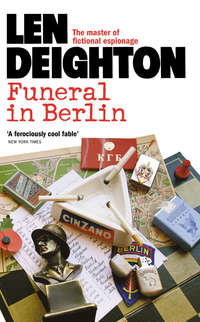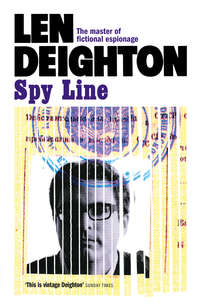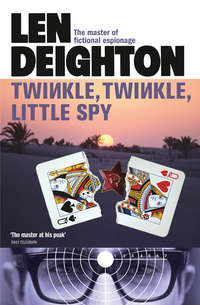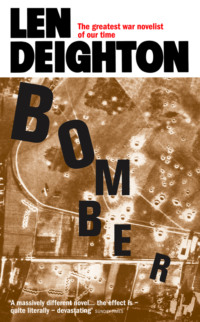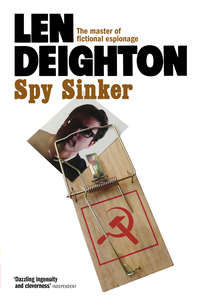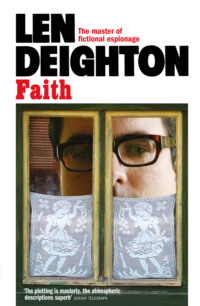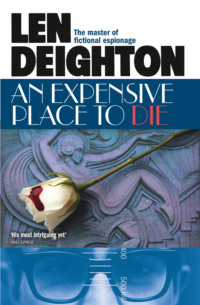
Полная версия
Horse Under Water
Jean said, ‘Yes,’ very slowly and doubtfully.
‘By that time I shall be in the porch of, say, Number 29. When they get their car started I will take a potato, which I shall have taken from your vegetable basket and, running forward, crouching very low, I shall jam the raw unpeeled potato on to their exhaust pipe and hold it there. It’s only a matter of moments before the pressure builds up enough to blow the cylinder head off with a tremendous crash.’ Jean giggled. ‘There they will be with an expensive disabled car. They will never get a taxi at this time of day at Gloucester Road cab rank, so they will have to ask for a lift in the VW, which by this time will have had the heater going long enough to make it warm and comfortable. On the way to wherever they wish to go I shall say – quite casually, mark you – “what are you two young fellows doing in this neck of the woods on a Saturday midday?” and from one thing and another I shall soon find out who they work for.’
Jean said, ‘It’s not had a good effect on you, that Naval Depot.’
I dialled the Ghost exchange number and switchboard answered. I put a hand over the mouthpiece while asking Jean, ‘What is the code word for the week-end?’
‘Fine pickle you’d be in without me,’ she said from the kitchen.
‘Don’t carp, girl. I haven’t been in to the office for a week.’
‘It’s “cherish”.’
‘Cherish,’ I said to the switchboard operator, and he connected me to the W.O.O.C.(P) duty officer, ‘Tinkle’ Bell.
‘Tinkle,’ I said, ‘cherish.’
‘Yes,’ said Tinkle. I heard the click of the recording machine being switched into the circuit. ‘Go ahead.’
‘I have a tail. Anything on W.M.?’ Tinkle went to look at the Weekly Memoranda sheets that came from the Joint Intelligence Agency at the Ministry of Defence. I heard Tinkle’s outsize brogue shoes pad lightly back to the desk. ‘Not a sausage, old boy.’
‘Do me a favour, Tinkle.’
‘Anything you say, old boy.’
‘You have someone you could leave in charge if you nipped down to Storey’s Gate for me?’
‘Certainly, old chap, pleasure.’
‘Thanks, Tinkle. I wouldn’t bother you on Saturday if it wasn’t important.’
‘Precisely, old boy. I know that.’
‘Go up to the third floor and see Mrs Welch – that’s W-e-l-c-h – and tell her you want one of the C-SICHfn2 files. Any one. I tell you what, make it a file we’re already holding. You with me?’
‘Sinking fast, old boy.’
‘Ask her for some file we already have and she’ll tell you we already have it, but you say we haven’t. She will show you the receipt book. If she doesn’t offer to, raise hell and insist that she does. Get a good eyeful of all the receipt signatures down the right-hand column. What I want to know is who receipted file 20 W.O.O.C.(P) 287.’
‘That’s one of our personal dossiers,’ said Tinkle.
‘Mine, to be precise,’ I said. ‘If I know who’s handled my file lately I have a lead on who might be tailing me.’
‘Very crafty,’ said Tinkle.
‘And, Tinkle,’ I added, ‘I want a quick check on two car registrations, a black Anglia and a Bristol 407.’ I waited while Tinkle read back the numbers.
‘Thanks, Tinkle, and ring me back at Jean’s.’
Jean poured me a third cup of coffee and produced some pancakes with sugar and cream. ‘You are a bit careless on an open line, aren’t you?’ she said. ‘C-SICH and file numbers and all that.’
I said, ‘If anyone listening isn’t in the business it will be gibberish, and if they are, they were taught that stuff in Dzerzhinski Street.’
‘While you were on the phone your Anglia arrived.’
I walked to the window. Four men were talking, well down the road. Soon two of them got into the Bristol and drove away, but the Anglia remained outside.
Jean and I spent a lazy Saturday afternoon. She washed her hair and I made lots of coffee and read a back issue of the Observer. The TV was just saying ‘… a Blackfoot war party wouldn’t be using a medicine arrow, Betsy …’ when the phone rang.
‘It was the Director of Naval Intelligence,’ I said into the phone before he could speak.
‘Blimey,’ said Tinkle, ‘how did you know?’
‘I thought D.N.I. would screen a visiting civilian pretty thoroughly before letting him into their diving school.’
Tinkle said, ‘Well, good thinking, old boy. Central Registerfn3 and C-SICH both booked your files out to D.N.I. on September 1st.’
‘What about the car registrations, Tinkle?’
‘The Anglia belongs to a man named Butcher, initials I. H., and the Bristol to a Cabinet Minister named Smith. Know them?’
‘I’ve heard the names before. Perhaps you would do an S6 report on both of them and leave it in the locked “in” tray.’
‘O.K.,’ said Tinkle and rang off.
‘What did he say?’ Jean asked.
‘I’m riding shotgun on the noon stage,’ I said. Jean made a noise and continued to paint a finger-nail flame orange.
Finally I said, ‘The cars belong to a Cabinet Minister named Henry Smith and to a little thug named Butcher who does a cut-price service in commercial espionage on the “seduced secretary” system.’
‘What a lovely system,’ Jean said.
‘You haven’t seen Butcher,’ I said. ‘My file, incidentally, went to D.N.I. on September 1st.’
‘Butcher,’ Jean said. ‘Butcher. I know that name.’ She painted another nail. Suddenly she shouted, ‘The ice-melting report.’
What a memory she had. Butcher had sold us an old German laboratory report about a machine to melt ice at an amazing speed. ‘What can you remember of that report?’ I asked her.
‘I couldn’t understand it properly,’ she said, ‘but the rough idea was that by rearranging the molecular structure of ice it would instantaneously become water. Or vice versa. That’s something the Navy might be keen on now that there are missile submarines that have to find a hole in the polar ice-pack before they can fire them.’ She held her hand at arm’s distance and studied the orange nails for a minute.
‘Yes,’ I said, ‘Butcher had the report. Navy want the report … That’s the connexion. I’m a genius.’
‘Why are you a genius?’ Jean asked.
‘For getting myself a secretary like you,’ I said. Jean blew me a kiss.
‘What about Mr Smith the Cabinet Minister?’ Jean asked.
‘He’s just having his car borrowed,’ I said. But I wasn’t sure about that. I looked at Jean and stubbed out my cigarette.
‘My nails are still wet,’ Jean said, ‘you mustn’t.’
5 No toy
My two weeks at Portsmouth passed quickly and I came home with a small Admiralty shallow-water certificate suitable for framing, and incipient pneumonia, although Jean said it was a sore throat. Monday I stayed in bed all day. Tuesday was a cold bright morning in September that warned you that winter was all set to pounce.
A letter from the Admiralty arrived authorizing me to take possession of the R.N. underwater gear from the school and charged it to me! The same post brought me another bill for the repair of the refrigerator and a final demand for the rates. I nicked my chin while shaving and bled like I’d sprung a leak. I changed into another shirt and arrived at Charlotte Street to find Dawlish in a quiet rage because I had made him late for the Senior Intelligence Conference that takes place in that strange square room of the C.I.G.S. the first Tuesday in each month.
It was a terrible day and it hadn’t even begun yet. Dawlish went through all the rigmarole of my new assignment: radio code words and priorities for communicating with him.
‘I’ve persuaded them to give you the equivalent authority to Permanent Under-Secretary, so don’t let them down. It might be useful if you deal with Denningfn1 or the Lisbon Embassy. You’ll remember that after last year they said they would never give us a rank above Assistant Secretary again.’
‘Big deal,’ I said, eyeing the papers on his desk. ‘P.U.S. and they send me on a Night Tourist aeroplane.’
‘All we could get,’ said Dawlish. ‘Don’t be so class-conscious, my boy, you don’t want us to demand that they off-load some unfortunate taxpayer; why, you’d have the whole of Gibraltar polishing its blanco – or whatever soldiers do.’
‘All right,’ I said. ‘All right, but you don’t have to be so bloody gay about it all.’
Dawlish turned over the next paper on his desk. ‘Equipment.’ Before he could read on I interrupted.
‘That’s another thing, they’ve put about two thousand quids’ worth of Admiralty equipment on my personal charge.’
‘Security, old chap, don’t want those career-mad Admiralty people to know all our little secrets.’
I nodded. ‘Look,’ I said, ‘I’ll need your signature if I am to draw a pistol from War Office armoury.’ There was a long silence, broken only by the sound of Dawlish blinking.
‘Pistol?’ said Dawlish. ‘Are you going out of your mind?’
‘Just into my second childhood,’ I said.
‘That’s right,’ said Dawlish, ‘they are nasty, noisy, dangerous toys. How would I feel if you jammed your finger in the mechanism or something?’
I picked up the air ticket and underwater-gear inventory and walked to the door.
‘West London 9.40,’ he said; ‘try to have the Strutton report ready before you leave, and …’ He removed his glasses and began to polish them carefully. ‘You have a pistol of your own that I am not supposed to know about. Don’t take it with you, there’s a good chap.’
‘Not a chance,’ I said, ‘I can’t afford the ammunition.’
That day I completed my report for the Cabinet on the Strutton Plan. The plan was to have a new espionage network of people feeding information back to London. All of them would be telephone, cable, telex operators or repair engineers working in embassies or foreign government departments. It meant setting up employment agencies abroad which would specialize in this type of employee. As well as describing the new idea my report had to outline the operations side, i.e. planning, communications, cut-outs,fn2 post boxesfn3 and a superimposed systemfn4 and, most important as far as the Cabinet report was concerned, costing.
Jean finished typing the report by 8.30 p.m. I locked it into the steel ‘out’ box, switched on the infra-red burglar-alarm system and set the special phone system to ‘record’. Next door was our telephone exchange: Ghost, used in the same way that the Government used Federal exchange. Anyone dialling one of our numbers by mistake heard about a minute and a half of the ‘number obtainable’ signal before it began ringing. After that the night operators next door challenged the caller, then our phone rang. There were advantages; I could for instance call a number on Ghost from any phone and have the operator connect me to anywhere in the world without attracting attention.
Jean put the typewriter ribbons into the safe. We said good night to George the night man and I put my tickets for B.E.A. 062 into my overcoat.
Jean told me about the carpet she’d bought for her flat and promised to fix me dinner when I returned. I told her not to leave the Strutton Plan report with O’Brien, suggested at least three different excuses she could give him, and promised to look out for a green suede jacket in Spain, size 36.
6 Ugly rock
The airport bus dredged through the sludge of traffic as sodium-arc lamps jaundiced our way towards Slough. Cold passengers clasped their five-shilling tickets and one or two tried to read newspapers in the glimmer. Cars flicked lights, shook their woolly dollies at us and flashed by, followed by ghost cars of white spray.
At the airport everything was closed and half the lighting switched off to save the cost of the electricity we had paid seven and six airport tax for. A long thin line of passengers shuffled down the centre of the draughty customs hall while Immigration men snapped passports in their faces with impartial xenophobia. In the lounge a blonde with smudged mascara played us a gay tune on her teeth with a ballpoint pen before we were sealed into the big, shiny, aluminium pod.
Sitting near the front of the aircraft was a plump man in a plastic raincoat. His red face was familiar to me and I tried to remember in what connexion. He was bellowing loudly about the air conditioning.
The surrounding airport was twittering with Klee-like coloured lights and signs. Inside the cabin the strongest had fought for and won their window seats, sick bags were ready and cabin temperature control set at ‘Roast’. Starters whined, dipped the cabin lights to half strength and heaved at the propeller blades. The big motors pounded the wet air, settled into a roar and dragged us up the black ramp of night.
The automatic pilot took control; white plastic cups danced and shuddered across the little stage clipped before me, shedding plastic spoons and large wrapped sugar segments.
I could see the back of the plump man’s head. He was shouting. I tried to remember everyone who had been involved in the ice-melting file transaction, and wondered if Dawlish had checked this passenger list.
Eight thousand feet. Beneath us green veins of street-lighting X-rayed Weymouth on to the night. Then only the dark sea.
Thin damp triangles of bread clung helpless across the pliable plate. I ate one. The steward poured hot coffee from the battered metal pots in appreciation. Constellations of city lights merged with icicles of stars suspended in the cavern of the sky.
I dozed until – Plonk Plonk – the undercarriage came down and cabin lighting was turned fully bright to open sleep-moted eyes. As the plane rumbled to a halt anxious holidaymakers clasped last year’s straw hats and groped towards the exit door.
‘Goodnightsirandthankyou … goodnightsirandthankyou … goodnightsirandthankyou …’ The stewardess bestowed a low communion upon departing passengers.
The plump man edged his way along the plane towards me. ‘Number 24,’ he said.
‘What?’ I said nervously.
‘You are number 24,’ he said loudly. ‘I never forget a face.’
‘Who are you?’ I asked.
His face bent into a rueful smile. ‘You know who I am,’ he shouted. ‘You are the man in flat number twenty-four and I am Charlie the milkman.’
‘Oh yes,’ I said weakly. It was the milkman with the deaf horse. ‘Have a good holiday, Charlie. I’ll settle up when you get back.’
‘Coaches for Costa del Sol,’ the loudspeakers were saying. The Customs and Immigration gave a perfunctory sleepy nod and stamped ‘30 days’ on the passport.
I could see a square, solid, British figure fighting through the Costa del Sols. ‘Welcome to Gibraltar,’ said Joe MacIntosh, our man in Iberia.
7 Short talk
Joe MacIntosh drove me out to one of the married-officer accommodations along Europa Road past the military hospital. It was 3.45 a.m. The streets were almost empty. Two sailors in white were vomiting their agonizing way to the Wharf and another was sitting on the pavement near Queen’s Hotel.
‘Blood, vomit and alcohol,’ I said to Joe, ‘it should be on the coat of arms.’
‘It’s on just about everything else,’ he said sourly.
After we’d had a drink Joe promised to brief me in the morning before he went on ahead. I slept.
We had breakfast in the mess and the water supply wasn’t quite as salty as I remembered it. Joe filled in some of the details.
‘We have been hearing about this counterfeit paper money for some years; it’s being washed up out of the sea.’
I nodded.
‘I’ve made a little sketch map.’
Joe opened his wallet and pulled out a page of a school exercise book. On it was drawn a shaky tracing of the south-western quarter of the Iberian peninsula. The Straits of Gibraltar were in the bottom right-hand corner. Lisbon was near the top left. Small mapping-pen crosses had been inked in along the coastline. The 100-kilometre stretch between Sagres (on the extreme south-western tip) and Faro curved, in a 100-kilometre-long bay. Trapped into the curve like bubbles were most of Joe’s little marks.
Joe began to tell me the arrangements he had made. ‘The nearest town to the wreck is Albufeira, here …’ Joe hadn’t changed much from the tall, muscular, Intelligence Corps lieutenant who came to Lisbon as my assistant in 1942. ‘… This is a list of all the wrecks that have happened between Sagres and Huelva and …’ Scores of young Intelligence Officers came to Lisbon in ’41 and ’42, all anxious to spend one strenuous week bringing the Axis to its knees. Mostly they fell prey to the simplest little security traps we set or they got into arguments with Germans in cafés. We hooked their new boys and they hooked ours, and old timers (anyone who had spent more than three months there) exchanged sardonic smiles with their enemy opposite number over thimbles of black coffee. ‘… using an Italian civilian frogman with whom I have worked before. He is perhaps the best frogman in Europe today. If you stop overnight in the town I have marked I’ll phone him to meet you there. Code word: conversation. I’ll be going by another route.’
‘Joe,’ I said. Through the window I could just see Mount Hacho on the North African mainland across the clear air and sunny water of the Straits. ‘What have you been told about this operation?’
Joe slowly brought a packet of cigarettes from his pocket, took one and offered them.
‘No thanks,’ I said. He lit his own and then put away his matches. His hands moved very slowly but I knew his mind was working like lightning.
He said, ‘You know the Wren with the rather large …’
‘I know the one,’ I said.
‘She’s the cipher clerk,’ Joe said. ‘I was chatting her up the other day when I noticed a clip-board with carbons of all the messages I’ve sent from here to London over the last two months. They all had BXJ in the corner. I’d never heard of that priority before, so I asked her what it was.’ He dragged on the cigarette. ‘They are sending all our signals traffic to somebody in London for analysis.’ Joe looked at me quizzically.
‘Who?’ I said.
‘She’s only the clerk,’ Joe said, ‘it’s the signals officer that redirects them, but she …’ He tailed off.
‘Go on.’
‘She’s not sure.’
‘So she’s not sure.’
‘But she thinks it goes to somebody c/o the House of Commons.’
I signalled for some more coffee and the Spanish waitress brought us a big jug. ‘Have some coffee,’ I said, ‘and relax; it’ll all work out.’
He gave me a shy Li’l Abner smile. ‘I wanted to tell you,’ he said, ‘but it sounds so unlikely.’ We went down to Andalusian Cars in City Mill Lane to pick up a grey Vauxhall Victor for me and a Simca for Joe. He started out for Albufeira and would be there before evening. I had some things to attend to in Gibraltar and my journey would be in two hops.
It was still the same squalid town that I remembered from wartime. Huge barrack-like bars with everything breakable long since removed or broken. Accordion music and drunken singing, red-necked military policemen bullying fat soldiers, thin-lipped army wives weaving among the avaricious Indian shopkeepers on the sun-bright pavement. The secret of enjoying Gibraltar, a ship’s doctor had once told me, is not to get off the boat.
8 I hit it
Wednesday morning
The end of Gibraltar’s High Street is Spain. Grey-suited frontier guards nodded, looked for transistor radios and watches, then nodded again. I drove through a couple of hundred yards of dead ground, then through the second control post. The road winds back through Algeciras, and looking across Algeciras Bay one sees the whole of Gib. lying there like a wedge of stale cheese; from the heights where the apes stare down to the airport, to the south where the Ponta de Europa drops away to the sea.
After Algeciras the road began to climb. At first it was dry as burnt toast, but soon white steamy cloud twined through the wheels or sat in heaps on the quiet road. To the left a cliff top was as jagged as a picnic tin. The road descended and followed the beaches northward. It was 3 p.m. The sky was as blue as the Wilton diptych and the warm air drew the smog from my lungs.
Sucking nourishment from the Seville highway, Los Palacios is a huge, gangling village that would be a town if it could afford the paving stones. Great loops of underpowered electric bulbs stared fish-eyed into the twilight as I drove in. One café had a new Seatfn1 1400 outside it. The name EL DESEMBARCO was painted in gaunt letters, deep set into the dark doorway. I put my foot softly on to the brake. A big diesel lorry hooted behind me as I pulled off the roadway. The lorry parked too and the driver and his mate went inside. I locked up and followed.
There were about thirty customers in one huge barn-like room. Smoked hams and bottles were strung across the walls, and large mirrors with gold advertisements hung from the wall and gave curious sloping dimensions to the reflected drinkers. A glittering Espresso machine roared and pounded. On the black matt counter-top bills were chalked and computed by boys with damp white faces who darted between the gigantic barrels, stopping only to wring out their aprons in gestures of despair, and shout plaintive entreaties to the kitchen in high waiters’ Spanish that cut through the clouds of smoke and talk.
I girded up my conversation.
‘Deme un vaso de cerveza,’ and the waiter brought me a bottle of beer, a glass and a small oval plate of freshly boiled shrimps, moist and delicious. I asked him about rooms. He slipped his white apron over his head and hung it on a hook under the Jayne Mansfield calendar. I hate to think what it might have been advertising. The boy led me out through the rear door. To my right I saw the flare of the kitchen and caught the piquant smell of Spanish olive oil. It was almost dark.
There was a sandy courtyard at the back, partly covered with bamboo from which hung rusting neon lights. Down one side of the courtyard a glassed-in stone corridor gave access to small, cell-like rooms. I negotiated a pram and a Lambretta motor scooter and entered my room. It contained an iron bedstead with crisp clean sheets, a table and a cupboard for a chamber-pot.
‘Veinte y cinco – precios fijos si v gusta,’ said the waiter. A fixed price of twenty-five pesetas seemed O.K. to me. I dumped my overnight bag, gave a Gauloise to the waiter, lit both our cigarettes and went back to the noisy restaurant.
The waiters were serving wine, coffee, sherry, and beer as fast as they could go – putting a squirt of soda into a glass from a distance of two feet, slamming down little plates of smoked ham, salt biscuits or shrimps, arguing with the drunks while adroitly serving the sober. The big tent of sound throbbed against the rafters and hammered down again.
All through the fish soup and omelette I waited for my contact. I asked who owned the new car outside. The boss owned it. I had more Tio Pepes and watched the lorry driver who had hooted me doing a card trick. At 10.30 I wandered out front. Three men in overalls sat on the unpaved ground drinking from a flagon of red wine, two children without shoes were throwing stones at the big diesel truck and some men were arguing quietly about the market value of a used motor-cycle tyre.
I unlocked the door of the car and reached under the dashboard for the .38 Smith & Wesson hammerless 6-shot. The grips were powerful magnets. I pulled it away from the car body, folded it into the car documents, locked up and walked back to my room.
My overnight bag still had my used match lying on it, but before going to sleep I opened the little cupboard and put my gun under the chamber-pot.
9 I sit on it
The sun was scorching the courtyard in which I took Thursday’s breakfast. Potted geraniums surrounded the well, and pink convolvulus climbed along the bamboo roofing. Half concealed by the limp washing, a large pockmarked Coca-Cola advert was bleached faint pink by the sun, and the church tower from which nine dull clanks came was toylike in the distance.


